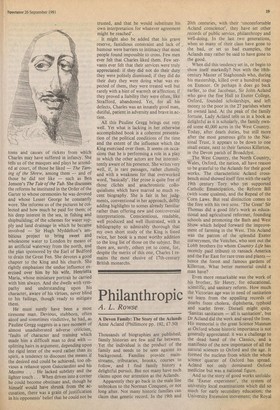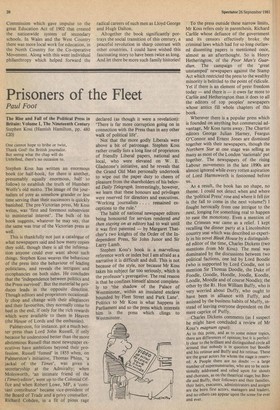Philanthropic
A. L. Rowse
A Devon Family: The Story of the Aclands Anne Acland (Phillimore pp. 192, £7.50) Thousands of biographies are published; family histories are few and far between. Yet the individual is the product of the family and needs to be seen against its background. Families provide mainstreams, tributaries, brooks, courses to follow, and I find family history a delightful pursuit. But not many have such claims upon our attention as the Aclands.
Apparently they go back in the male line unbroken to the Norman Conquest, or not long after. Not many historic families can claim that genetic record. In the 19th and 20th centuries, with their 'uncomfortable Acland conscience', they have set other records of public service, philanthropy and well-doing. In the last two generations, when so many of their class have gone to the bad, or set us bad examples, the Aclands may rather be said to have gone to the good.
When did this tendency set in, or begin to show itself markedly? Not with the 18th century Master of Staghounds who, during his mastership, killed over a hundred stags on Exmoor. Or perhaps it does go back earlier, to that Jacobean, Sir John Acland who gave the fine Hall to Exeter College, Oxford, founded scholarships, and left money to the poor in the 27 parishes where he owned land. At the peak of the family fortune, Lady Acland tells us in a book as delightful as it is scholarly, the family owned some 40,000 acres in the West Country. Today, after death duties, but still more after the most generous gifts to the National Trust, it appears to be down to one small estate, next to their famous Killerton, in the Devon parish of Broadclyst.
The West Country, the North Country, Wales, Oxford, the nation, all have reason to be grateful to the Aclands for their good works. The characteristic Acland crossbench mind showed itself first with the early 19th century Tory who yet supported Catholic Emancipation, the Reform Bill (with some qualms), and the Repeal of the Corn Laws. But real distinction comes to the fore with his two sons. 'The Great' Sir Thomas did a good life's work as educa tional and agricultural reformer, founding schools and promoting the Bath and West Show which helped forward the improve ment of farming in the West. This Acland was the patron of the splendid Exeter nurserymen, the Veitches, who sent out the Lobb brothers (to whom Country Life has recently paid tribute) to ransack America and the Far East for rare trees and plants — hence the forest and famous gardens of Killerton. What better memorial could a man have?
Even more remarkable was the work of his brother, Sir Henry, for educational, scientific, and sanitary reform. How much the Victorian age was in need of sanitation we learn from the appalling records of deaths from cholera, diphtheria, typhoid and scarlet fever. Disraeli might quip, `Sanitas sanitatum — all is sanitation', but Dr Acland did the work and saved the lives.
His memorial is the great Science Museum at Oxford whose historic importance is not generally appreciated: it was a challenge to the dead hand of the Classics, and a manifesto of the new importance of all the natural sciences to Oxford and the age. It formed the nucleus from which the whole science quarter of Oxford has spread. Acland not only dominated Oxford medicine but was a national figure.
And so the story of good works unfolds: the 'Exeter experiment', the system of university local examinations which did so much for early secondary education; the University Extension movement; the Royal Commission which gave impulse to the great Education Act of 1902 that created the nationwide system of secondary schools. In Wales and the West Country there was more local work for education, in the North Country for the Co-operative Movement. Along with this went individual philanthropy which helped forward the radical careers of such men as Lloyd George and Hugh Dalton.
Altogether the book significantly portrays the social transition of this century, a peaceful revolution in sharp contrast with other countries. I could have wished this fascinating story to have been twice as long. And let there be more such family histories!



































 Previous page
Previous page